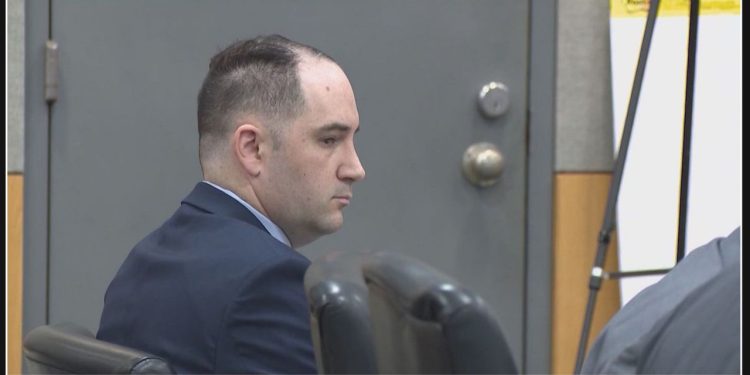Daniel Perry, who was previously convicted of murder in the death of Garrett Foster but later pardoned by the governor, is now facing charges of deadly conduct in court.
A Texas man who was pardoned by the governor earlier this year found himself back in a Travis County courtroom on Tuesday. His attorneys are currently working to dismiss an indictment for a separate misdemeanor charge that he is facing.
Earlier this year, Governor Greg Abbott granted a pardon to Daniel Perry, who had been found guilty of murder for fatally shooting Garrett Foster during a Black Lives Matter protest in 2020. However, despite the pardon, Perry still faced remaining legal challenges.
Perry is still dealing with a misdemeanor charge of deadly conduct for his alleged actions on the night of the shooting that ultimately led to Foster’s death. According to Texas law, a deadly conduct charge is applicable when an individual knowingly discharges a firearm at another person or a building.
If Perry is found guilty of the deadly conduct charge, he could potentially face up to a year of imprisonment. It’s worth noting that he has already served a little over a year in prison before being pardoned, which could be taken into account by the judge during sentencing.
The defense has filed a motion to dismiss the indictment.
Defense’s motion to throw out the indictment
This Article Includes [hide]
In court on Tuesday, Perry’s lawyers presented two motions: one to quash the indictment for the misdemeanor charge and another to dismiss it. Their objective is to ensure that Perry is not tried for something he has already been pardoned for.
The misdemeanor charge against Perry is related to his actions of driving through the crowd of protesters and firing shots, rather than specifically tied to Foster’s death. Perry’s defense team argues that since the indictment fails to mention the specific pedestrians who were endangered in the vicinity, the judge should dismiss it.
Perry’s attorneys argue that they cannot provide him with a strong defense unless they are aware of the individuals he is specifically accused of endangering. They further contend that without a clear identification of these pedestrians, Perry may potentially face charges for a crime he has already been tried and acquitted for.
Prosecutors contend that the specific identification of individuals is inconsequential, as it is Perry’s actions that endangered them. In response, Perry’s legal team asserts that his constitutional rights to be informed of the pedestrians’ names are of utmost importance, as it safeguards him against facing multiple convictions for the same offense, irrespective of whether the indictment is centered on his conduct or not.
The judge is anticipated to reach a decision regarding the defense’s motion to quash the indictment by the end of the week. If the judge opts not to quash it, there might be a subsequent hearing on January 9th to address their motion to dismiss the indictment.
Perry’s defense is seeking a hearing as part of their motion to dismiss the indictment. They aim to call David Fugitt, the lead investigator with APD for Perry’s case, as a witness. They believe Fugitt’s testimony will be significant in determining whether the indictment should be dismissed. According to Fugitt’s affidavit, he alleges that the District Attorney’s Office tampered with him as a witness and instructed him to omit exculpatory information that he intended to present to the grand jury in this case.
Background on this case
Background on this case
On July 25, 2020, Perry, who was working as a rideshare driver at the time, found himself on a street where a group of people were protesting police brutality. Unfortunately, this unexpected turn led to a confrontation between Perry and Garrett Foster.
Perry’s lawyers claim that he had just finished dropping off a rideshare customer in Downtown Austin when a group of protesters surrounded his car. It is alleged that some of the demonstrators, including Foster who was armed with a rifle, proceeded to attack Perry’s vehicle.
Perry’s lawyers argued that Foster had raised the weapon, which led Perry to shoot him. Perry immediately dialed 911 for help, but unfortunately, Foster did not survive the incident.
A grand jury indicted Perry with murder, deadly conduct, and aggravated assault in July 2021, following a thorough examination of the evidence.
Several witnesses provided testimony during the murder trial, shedding light on Perry’s demeanor before and after the encounter with Foster, as well as the atmosphere among the protesters and Foster’s handling of his gun. The testimonies came from various individuals, including fellow protesters, a citizen journalist, crime scene specialists, a gun examiner, and the medical examiner who conducted Foster’s autopsy, among others.
During the trial, the jury had the opportunity to view various videos and photos as evidence. In addition, prosecutors presented social media posts to support their argument that Perry had previously made threats towards protesters.
In April 2023, Perry was found guilty of murder in connection with Foster’s death by the jury. Following this, Gov. Abbott requested the Texas Board of Pardons and Paroles to review the case. At the same time, Perry’s defense team filed a motion for a new trial, which was subsequently denied.
In May 2023, Perry received a 25-year prison sentence. In February of this year, the Board of Pardons and Paroles initiated their review of Perry’s case for clemency. Shortly after, Abbott granted Perry a pardon, leading attorneys general from other states to request an investigation by the U.S. Department of Justice.
In June 2024, the Travis County District Attorney, José Garza, attempted to reverse Perry’s pardon by filing a petition. However, the Texas Court of Criminal Appeals rejected the petition.
Also Read:
- Suspect arrested in Texas for allegedly using industrial saw to break into ATMs
- Texas police apprehend the Saw Bandit, wanted for vandalizing ATMs

